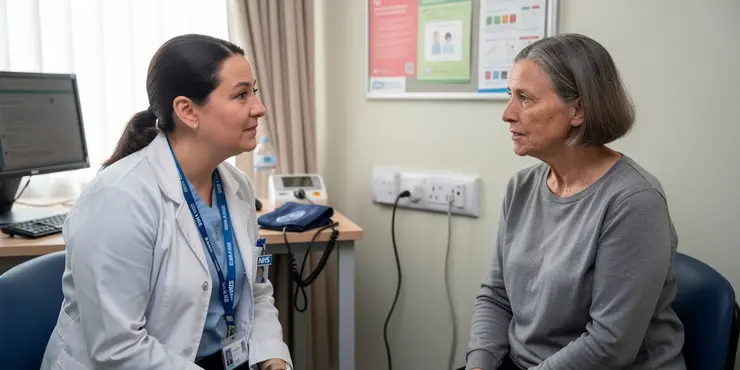
Find Help
More Items From Ergsy search
-
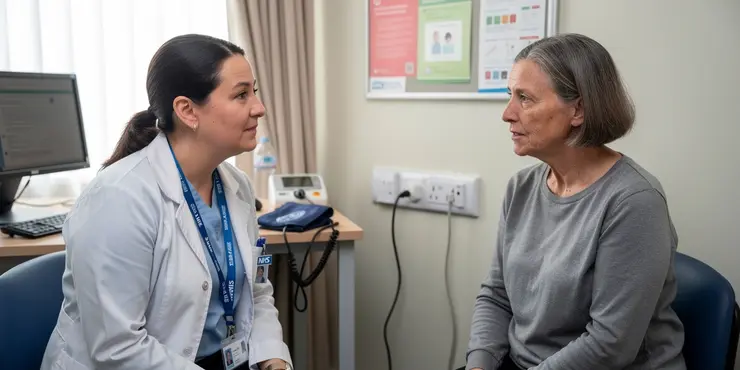
Can CFS be prevented?
Relevance: 100%
-

What is the prognosis for someone with CFS?
Relevance: 69%
-
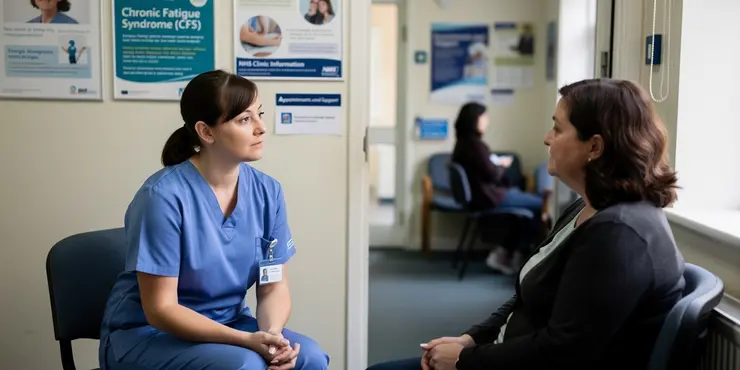
Why is it important to increase awareness about CFS?
Relevance: 65%
-
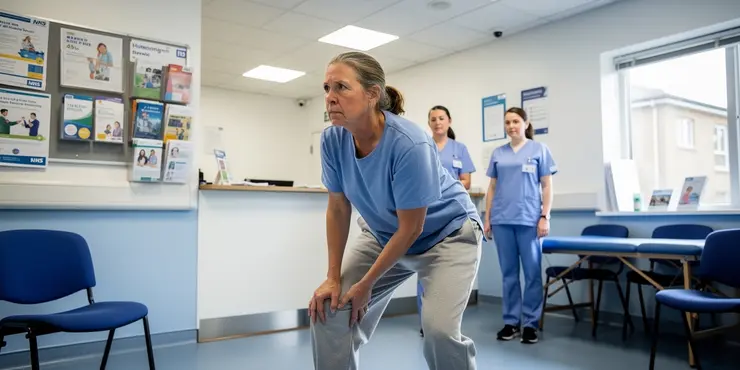
Does physical exercise help people with CFS?
Relevance: 65%
-

Can CFS symptoms fluctuate over time?
Relevance: 65%
-

How does CFS differ from regular fatigue?
Relevance: 64%
-
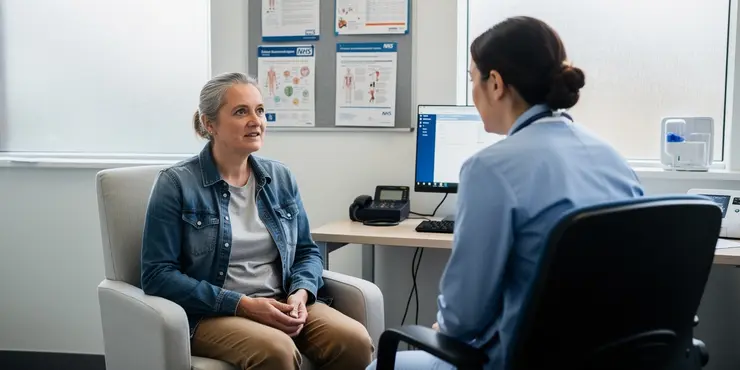
How does post-exertional malaise relate to CFS?
Relevance: 63%
-

Who is at risk of developing chronic fatigue syndrome?
Relevance: 41%
-

What role do infections play in chronic fatigue syndrome?
Relevance: 39%
-
What is chronic fatigue syndrome?
Relevance: 38%
-
Can children develop chronic fatigue syndrome?
Relevance: 37%
-

How is chronic fatigue syndrome treated?
Relevance: 36%
-

Are there psychological aspects to chronic fatigue syndrome?
Relevance: 36%
-

Is chronic fatigue syndrome contagious?
Relevance: 34%
-

Can hypotony be prevented?
Relevance: 27%
-
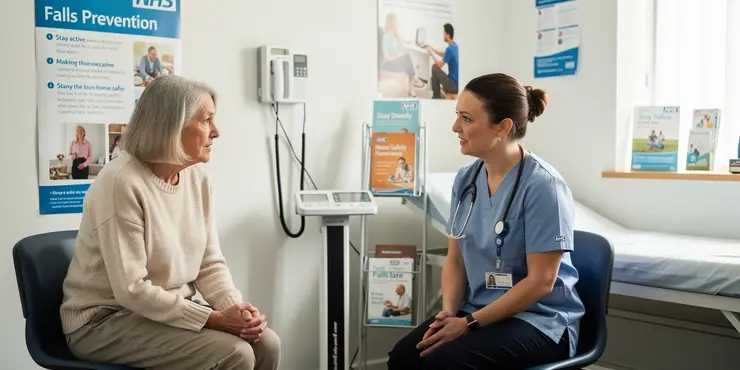
Falls Prevention Podcast
Relevance: 27%
-

Can gonorrhoea be prevented?
Relevance: 27%
-

Can meningitis be prevented?
Relevance: 27%
-

Falls and Falls Prevention
Relevance: 27%
-

Can chickenpox be prevented?
Relevance: 27%
-

Can Rubella be prevented?
Relevance: 27%
-

Can sunburn be prevented?
Relevance: 27%
-
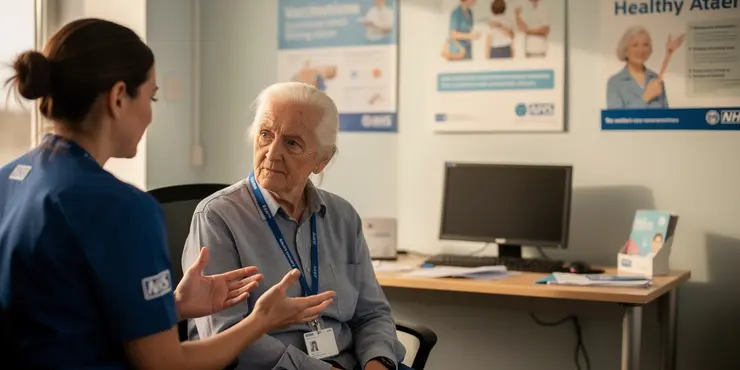
Can shingles be prevented?
Relevance: 27%
-

Is postnatal depression preventable?
Relevance: 26%
-

Can shingles be prevented?
Relevance: 26%
-
Are there preventative measures for eating disorders?
Relevance: 25%
-

How can HPV be prevented?
Relevance: 25%
-

How can obesity be prevented?
Relevance: 25%
-

How can HIV be prevented?
Relevance: 25%
-

How can concussions be prevented?
Relevance: 25%
-
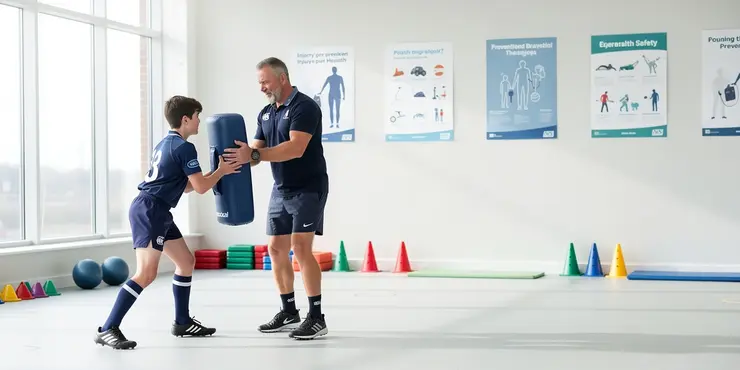
How can concussions be prevented?
Relevance: 25%
-

Can the bubonic plague be prevented?
Relevance: 25%
-

Is there any way to prevent concussions?
Relevance: 25%
-

Can hay fever be prevented?
Relevance: 25%
-
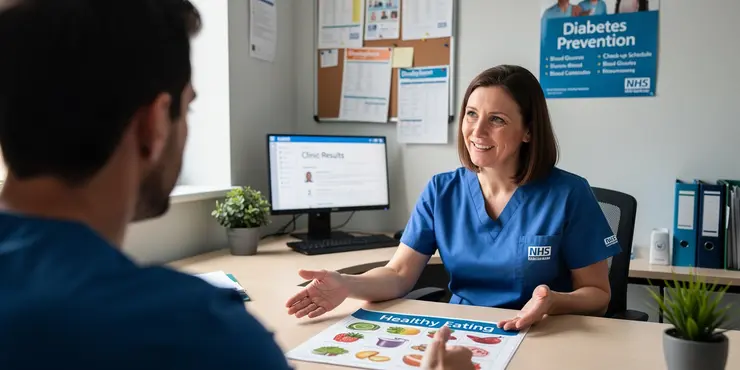
Can Type 2 Diabetes be prevented?
Relevance: 25%
-
Is it possible to prevent grooming entirely?
Relevance: 25%
-

Can heart failure be prevented?
Relevance: 25%
-

Can nettle rash be prevented?
Relevance: 25%
-

Can bowel cancer be prevented?
Relevance: 25%
-

Diabetes Care - Preventing Amputations
Relevance: 25%
Understanding Chronic Fatigue Syndrome (CFS)
Chronic Fatigue Syndrome (CFS), also known as Myalgic Encephalomyelitis (ME), is a complex and debilitating disorder characterized by extreme fatigue that cannot be explained by any underlying medical condition. CFS affects around 250,000 people in the UK, and the symptoms can be severe enough to impact daily activities and quality of life. Despite ongoing research, the exact cause of CFS remains unknown, making prevention a challenging topic for healthcare professionals and researchers.
Risk Factors Associated with CFS
While the precise cause of CFS is yet to be identified, various factors have been suggested to contribute to its development. These include viral infections, immune system problems, hormonal imbalances, and psychological stress. Certain genetic predispositions may also play a role in increasing susceptibility to CFS. Additionally, factors such as age, gender, and prior health conditions are considered potential risk factors. Women are diagnosed with CFS more often than men, and it most commonly develops in people in their 40s and 50s.
Current Approaches to CFS Prevention
Due to the uncertain etiology of CFS, specific preventative measures remain unclear. However, strategies focusing on potential risk factors might help mitigate the onset or severity of the condition. Maintaining a healthy lifestyle is vital. This includes following a balanced diet, getting regular exercise, and ensuring adequate sleep. Stress management techniques, such as mindfulness and relaxation exercises, may also be beneficial in reducing the risk or impact of CFS symptoms. Awareness and education about the condition can potentially aid early detection and intervention, although no definitive preventive approach has been established.
Importance of Early Intervention
Early diagnosis and management of CFS symptoms can positively influence the progression of the condition. If someone experiences prolonged fatigue and other associated symptoms, seeking medical advice is critical. Early intervention can help manage symptoms more effectively and improve quality of life. Patients may benefit from a multi-disciplinary approach, involving healthcare professionals such as doctors, physiotherapists, and occupational therapists. This collaborative approach can create an individualized management plan that addresses both physical and mental health aspects of CFS.
Research and Future Directions
Research into the causes, treatment, and prevention of CFS is ongoing. Scientists continue to explore various biological, psychological, and genetic factors that might contribute to the onset of the condition. Understanding these underlying mechanisms could lead to the development of more effective prevention strategies. Meanwhile, advocacy and support for those affected by CFS are crucial, ensuring patients receive the appropriate care and attention while further research is conducted. As science progresses, an improved understanding of CFS may offer hope for the development of preventive measures in the future.
Understanding Chronic Fatigue Syndrome (CFS)
Chronic Fatigue Syndrome (CFS) is also called Myalgic Encephalomyelitis (ME). It is a long-term illness that makes people very tired. This tiredness is not caused by other health problems. In the UK, about 250,000 people have CFS. The tiredness can be so bad that it makes everyday life hard. We still do not know what causes CFS, so stopping it before it starts is difficult for doctors and researchers.
Risk Factors Associated with CFS
We do not know what exactly causes CFS. But, some things might make it more likely to happen. These things include getting sick from a virus, problems with the immune system, hormone changes, and feeling very stressed. Having certain genes might also make it more likely to get CFS. Age, gender, and other health problems can also be risk factors. Women get CFS more often than men. It usually starts in people in their 40s and 50s.
Current Approaches to CFS Prevention
Since we do not know what causes CFS, it is hard to say how to stop it. But, there are some things people can do to try to stay healthy. Eating good food, exercising, and getting enough sleep are important. Managing stress with things like mindfulness or relaxation exercises can help too. Learning about CFS can help people spot it early and get help, but we do not have a sure way to prevent it yet.
Importance of Early Intervention
Getting help early can make a big difference with CFS. If someone feels very tired for a long time, they should see a doctor. Getting help early can make the tiredness better and help people live a better life. Doctors, physiotherapists, and occupational therapists can all work together to help. They can make a plan that helps both the body and mind.
Research and Future Directions
Scientists are working hard to learn more about what causes CFS and how to treat it. They are looking at biology, psychology, and genes. This research might help us find better ways to stop CFS in the future. It is important to support people with CFS and make sure they get good care. As we learn more, there is hope for new ways to prevent CFS one day.
Frequently Asked Questions
What is Chronic Fatigue Syndrome (CFS)?
Chronic Fatigue Syndrome (CFS) is a complex disorder characterized by extreme fatigue that cannot be explained by any underlying medical condition.
Can Chronic Fatigue Syndrome be prevented?
There is currently no known way to prevent Chronic Fatigue Syndrome, but managing lifestyle factors and stress may help reduce the risk.
What are the risk factors for developing CFS?
Risk factors for CFS may include stress, infections, environmental factors, and possibly genetic predisposition.
Does maintaining a healthy lifestyle help prevent CFS?
While a healthy lifestyle cannot guarantee prevention of CFS, it may help reduce risk and improve overall health.
How does stress relate to CFS?
Chronic stress is thought to potentially contribute to the development or exacerbation of CFS symptoms.
Can regular exercise reduce the risk of CFS?
Regular moderate exercise is beneficial for overall health, though it is not proven to prevent CFS specifically.
Is diet important in preventing CFS?
A balanced diet supports overall health and may help maintain energy levels, but direct prevention of CFS through diet alone is not established.
Can avoiding infections help prevent CFS?
Avoiding infections like EBV and other viral agents can be beneficial, but not all CFS cases are preceded by infections.
Are there any known genetic factors that contribute to CFS?
Research suggests a possible genetic component, but specific genes linked to CFS have not been definitively identified.
Does sleep quality affect the likelihood of developing CFS?
Poor sleep quality is a common symptom of CFS, and ensuring good sleep hygiene may support better health outcomes.
Can early intervention of symptoms prevent CFS?
Early intervention may alleviate symptoms, but it's unclear if it can prevent the progression to full-blown CFS.
What role do healthcare practitioners have in preventing CFS?
Healthcare providers can offer guidance on healthy living and management of symptoms, but direct prevention methods are limited.
Can mindfulness or meditation help in avoiding CFS?
Mindfulness and meditation can reduce stress and improve wellbeing, potentially lowering risk factors associated with CFS.
Is there a link between mental health and the development of CFS?
Mental health issues like depression and anxiety may overlap with CFS symptoms but are not direct causes.
How important is hydration in the prevention of CFS?
While hydration is vital for good health, it is not specifically known to prevent CFS.
Are there any vaccines available that can prevent CFS?
Currently, no vaccines are available or specifically designed to prevent CFS.
What lifestyle changes might reduce the risk of CFS?
Reducing stress, eating a balanced diet, regular physical activity, and ensuring quality sleep may contribute to overall health and potentially lower risk factors.
Can avoiding certain medications help prevent CFS?
No direct evidence links medications to CFS prevention, but discussing any medication concerns with a healthcare provider is important.
What role does social support play in preventing CFS?
Strong social support can improve mental health and may help mitigate some stress-related triggers associated with CFS.
Are there any ongoing research efforts to find ways to prevent CFS?
Yes, research is ongoing to better understand CFS and its causes, which may eventually contribute to prevention strategies in the future.
What is Chronic Fatigue Syndrome (CFS)?
Chronic Fatigue Syndrome (CFS) is a health problem. People with CFS feel very tired all the time. This tiredness does not get better with rest.
Some helpful tools and tricks for learning more about CFS include using simple word lists, taking breaks when reading, and listening to audio books or summaries.
Chronic Fatigue Syndrome (CFS) is a sickness that makes people feel very, very tired all the time. Doctors do not know why this happens, and it is not caused by another sickness.
Can we stop Chronic Fatigue Syndrome from happening?
Chronic Fatigue Syndrome (CFS) makes people feel very tired for a long time. Doctors do not know exactly how to stop it from happening. But there are things you can do to stay healthy: - Eat healthy food. - Get enough sleep at night. - Exercise a little bit when you can. - Talk to someone if you feel very worried or stressed. Ask a doctor or nurse for help if you have questions about feeling tired. Use pictures or videos to learn more. Talk with someone you trust about how you feel. They can help you understand more.Right now, there is no way to stop Chronic Fatigue Syndrome from happening. But, making healthy choices and keeping stress low might help you lower the chance of getting it.
What makes it more likely to get CFS?
Things that might make someone more likely to get CFS are stress, getting sick with infections, things around us in the environment, and maybe even something in our genes that we get from our parents.
Can living healthy stop CFS?
Helpful Tips:
1. Eat Healthy: Try to eat fruits and vegetables every day.
2. Move Your Body: Play outside or go for a walk to keep your body strong.
3. Sleep Well: Try to get a good night's sleep so you feel rested.
4. Stay Happy: Do things that make you feel happy and calm.
If reading is hard, try listening to audiobooks or using apps that read text out loud to you.
Living in a healthy way might not stop CFS, but it can help you stay healthier and feel better overall.
How does stress relate to CFS?
Stress is when you feel worried or upset. It can make you feel tired.
CFS, or Chronic Fatigue Syndrome, is when you feel very tired for a long time. Stress can make CFS worse.
To feel better, try relaxing activities like deep breathing or gentle exercise. You can also talk to someone you trust about how you feel.
Too much stress can make the symptoms of Chronic Fatigue Syndrome (CFS) worse. It might also help start CFS.
Can doing exercise help prevent CFS?
Exercise means moving your body to stay healthy and strong. CFS is when you feel very tired all the time, which is called Chronic Fatigue Syndrome.
Doing exercise could help you feel less tired. It might stop you from getting CFS.
Here are some ways to exercise:
- Go for a walk
- Ride a bike
- Play games outside
Ask an adult to help you find fun exercises to do.
Doing exercise that is not too hard is good for your health, but it doesn't stop CFS from happening.
Does What You Eat Help Stop CFS?
CFS stands for Chronic Fatigue Syndrome. It means you feel very tired all the time.
Eating the right food can help you feel better and have more energy.
Here are some ways to eat well:
- Eat fruits and vegetables every day.
- Drink lots of water.
- Avoid too much sugar and junk food.
- Try to eat at regular times.
If you want to learn more, you can:
- Ask a doctor or a nurse.
- Use apps to track what you eat.
- Look at pictures of healthy meals.
Eating a mix of different healthy foods can help you stay strong and feel full of energy. But, simply eating well won't stop CFS (chronic fatigue syndrome) by itself.
Can staying away from infections help stop CFS?
CFS stands for Chronic Fatigue Syndrome. It's a condition that makes people feel very tired for a long time.
Avoiding infections means trying not to get sick. This can help keep your body strong and may help stop CFS.
Here are some things you can do to avoid infections:
- Wash your hands often with soap and water.
- Stay away from people who are sick.
- Eat healthy foods to keep your body strong.
- Get enough sleep every night.
- Ask a grown-up if there are other ways to stay healthy.
If you need help reading or understanding, you can:
- Ask someone to read aloud and explain the words to you.
- Look at pictures or videos about staying healthy.
- Use apps or websites designed to help with reading.
It's good to stay away from germs and viruses like EBV because they can make you sick. But not everyone who gets CFS gets it because of an infection.
Do genes make people more likely to get CFS?
Some things in our bodies are passed down from our parents. These are called genes. Genes can sometimes cause health problems.
Scientists are trying to find out if genes can make people more likely to get CFS (Chronic Fatigue Syndrome). CFS makes people very tired and can affect their lives a lot.
If you find reading hard, you can:
- Ask someone to read with you.
- Use your finger to follow the words.
- Take breaks when you need to.
Scientists think there might be a part of our genes that makes some people have CFS. But, they haven’t found the exact genes yet.
Can bad sleep make you get CFS?
CFS means Chronic Fatigue Syndrome. It makes you feel very tired all the time.
Good sleep is important for health. Bad sleep might make you feel more tired.
If you have trouble sleeping, talk to someone who can help, like a doctor.
You can try these tips for better sleep:
- Go to bed at the same time every night.
- Make your room dark and quiet.
- Avoid screens before bed, like phones or tablets.
Many people with CFS have trouble sleeping well. Sleeping better can help you feel better. Try to have good bedtime habits.
Can getting help early stop CFS from happening?
CFS stands for Chronic Fatigue Syndrome. It's when someone feels very tired all the time. Seeing a doctor early might help stop CFS from getting worse.
If you think you might have CFS, tell a doctor. They can help you feel better.
Here are some things that can help:
- Rest a lot when you feel tired.
- Eat healthy foods and drink lots of water.
- Do gentle exercise like walking.
- Ask someone you trust for help and support.
Getting help early might make the symptoms better, but we don't know if it can stop the illness from getting worse.
How can doctors and nurses help stop CFS?
Doctors and nurses can help you live healthy and handle any health problems, but they can't always stop problems from happening.
Can thinking calm thoughts or meditating help stop CFS?
Doing mindfulness and meditation can help you feel less stressed. It can make you feel happier and healthier. This might also help you feel less tired if you have CFS (which is Chronic Fatigue Syndrome).
Can feeling sad or worried cause CFS?
People sometimes wonder if feeling sad or worried can make you get CFS. CFS is a short way to say Chronic Fatigue Syndrome. This means being very tired for a long time.
It's a good idea to talk to a doctor or a helper if you are worried about feeling sad or tired all the time.
Using pictures, videos, or playing games can help you understand more about how we feel and why we might be tired.
Sometimes people can feel very sad or worried, which are called depression and anxiety. These feelings can look a lot like how people feel when they have something called CFS. But feeling sad or worried does not make CFS happen. They are different things.
Why is drinking water important to stop feeling so tired?
Drinking enough water is very important. It helps us stay healthy and stops us from feeling very tired all the time.
If you drink enough water, your body works better and you feel more awake.
Try these tips to drink more water:
- Keep a water bottle with you.
- Drink water with your meals.
- Add some fruit slices to your water for taste.
Drinking water can help you feel good and have more energy each day.
Drinking enough water is very important for staying healthy. But, drinking water does not stop CFS (Chronic Fatigue Syndrome).
Can a vaccine stop CFS?
Doctors do not have a vaccine for CFS. CFS means Chronic Fatigue Syndrome. It makes people very tired.
If you have CFS, talk to a doctor or nurse. They can help you feel better.
Tools like pictures or stories might help you understand CFS more. Friends or family can help too.
Right now, there are no vaccines to stop CFS.
How can you change your life to feel less tired?
Here are some ways to help you stay healthy:
- Try to do things that make you feel calm and happy. This can help with feeling less worried.
- Eat lots of different types of food that are good for you, like fruits and vegetables, meat, and grains.
- Move your body every day by playing or doing fun exercises.
- Make sure you get a good night's sleep to feel fresh and ready for the next day.
Can staying away from some medicines stop CFS?
CFS stands for Chronic Fatigue Syndrome. It makes you feel very tired all the time.
Some people think that not taking some medicines might help stop CFS.
Talk to your doctor. They know a lot about medicines and can help you stay healthy.
You can also keep a diary of how you feel. Write down when you take medicine and how it makes you feel. This can help your doctor understand more about what helps you.
No medicine is proven to stop CFS. But it is a good idea to talk about your medicine worries with your doctor or nurse.
How does having supportive friends help stop CFS?
Supportive friends and family can help you stay healthy. They can make you feel better when you are sad or tired. They can also help you take breaks, eat well, and see a doctor when you need to.
Asking for help is important. Tell your friends and family how you feel. They can listen and support you. Use tools like reminder apps or a calendar to remember tasks. This can make life easier for you.
Having good friends and family around you can make your mental health better. They can also help you feel less stressed if you have CFS, which is a kind of tiredness that doesn't go away.
It is good to talk to people you trust when you feel worried. Writing in a diary or drawing can also help. Apps that remind you to stay calm and relax can be useful too.
Is there any research to stop people getting CFS?
Yes, scientists are working hard to learn more about CFS and why it happens. This might help us stop it in the future.
Useful Links
This website offers general information and is not a substitute for professional advice.
Always seek guidance from qualified professionals.
If you have any medical concerns or need urgent help, contact a healthcare professional or emergency services immediately.
Some of this content was generated with AI assistance. We’ve done our best to keep it accurate, helpful, and human-friendly.
- Ergsy carfully checks the information in the videos we provide here.
- Videos shown by Youtube after a video has completed, have NOT been reviewed by ERGSY.
- To view, click the arrow in centre of video.
- Most of the videos you find here will have subtitles and/or closed captions available.
- You may need to turn these on, and choose your preferred language.
- Go to the video you'd like to watch.
- If closed captions (CC) are available, settings will be visible on the bottom right of the video player.
- To turn on Captions, click settings .
- To turn off Captions, click settings again.
More Items From Ergsy search
-

Can CFS be prevented?
Relevance: 100%
-

What is the prognosis for someone with CFS?
Relevance: 69%
-

Why is it important to increase awareness about CFS?
Relevance: 65%
-

Does physical exercise help people with CFS?
Relevance: 65%
-

Can CFS symptoms fluctuate over time?
Relevance: 65%
-

How does CFS differ from regular fatigue?
Relevance: 64%
-

How does post-exertional malaise relate to CFS?
Relevance: 63%
-

Who is at risk of developing chronic fatigue syndrome?
Relevance: 41%
-

What role do infections play in chronic fatigue syndrome?
Relevance: 39%
-
What is chronic fatigue syndrome?
Relevance: 38%
-
Can children develop chronic fatigue syndrome?
Relevance: 37%
-

How is chronic fatigue syndrome treated?
Relevance: 36%
-

Are there psychological aspects to chronic fatigue syndrome?
Relevance: 36%
-

Is chronic fatigue syndrome contagious?
Relevance: 34%
-

Can hypotony be prevented?
Relevance: 27%
-

Falls Prevention Podcast
Relevance: 27%
-

Can gonorrhoea be prevented?
Relevance: 27%
-

Can meningitis be prevented?
Relevance: 27%
-

Falls and Falls Prevention
Relevance: 27%
-

Can chickenpox be prevented?
Relevance: 27%
-

Can Rubella be prevented?
Relevance: 27%
-

Can sunburn be prevented?
Relevance: 27%
-

Can shingles be prevented?
Relevance: 27%
-

Is postnatal depression preventable?
Relevance: 26%
-

Can shingles be prevented?
Relevance: 26%
-
Are there preventative measures for eating disorders?
Relevance: 25%
-

How can HPV be prevented?
Relevance: 25%
-

How can obesity be prevented?
Relevance: 25%
-

How can HIV be prevented?
Relevance: 25%
-

How can concussions be prevented?
Relevance: 25%
-

How can concussions be prevented?
Relevance: 25%
-

Can the bubonic plague be prevented?
Relevance: 25%
-

Is there any way to prevent concussions?
Relevance: 25%
-

Can hay fever be prevented?
Relevance: 25%
-

Can Type 2 Diabetes be prevented?
Relevance: 25%
-
Is it possible to prevent grooming entirely?
Relevance: 25%
-

Can heart failure be prevented?
Relevance: 25%
-

Can nettle rash be prevented?
Relevance: 25%
-

Can bowel cancer be prevented?
Relevance: 25%
-

Diabetes Care - Preventing Amputations
Relevance: 25%


